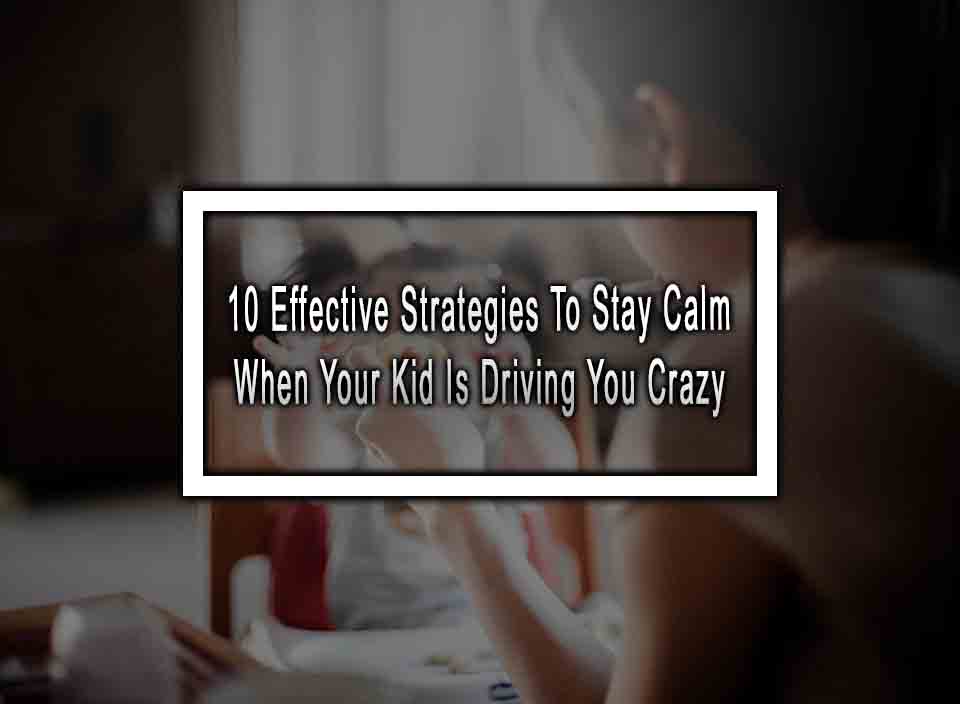Table of Contents
ToggleParents, Buckle Up! Tips to Stay Calm When Your Little One Turns the Volume Up
Parenting can be a wild ride, and there are moments when your kids may push you to your limits. But don’t worry, we’ve got you covered! In this article, we’ll provide you with 10 effective strategies to stay calm when your kid is driving you crazy. From taking deep breaths to seeking support, we’ll guide you through the chaos and help you maintain your sanity. So, fasten your seatbelts, parents, and get ready for a smoother ride!
1. Take a Deep Breath and Count to Ten
It offers a moment of pause, allowing parents to take a deep breath, release stress and anxiety, and reconnect with themselves. By emphasizing self-care, emotional well-being, and intentional parenting techniques, Deep Breath for Parenting empowers parents to build stronger relationships with their children, make conscious decisions, and find joy in the parenting journey. Whether facing challenges, seeking guidance, or simply looking for mindfulness practice to enhance their parenting skills, Deep Breath offers a supportive and nurturing space for parents to grow and thrive.
2. Embrace the Power of Positive Praise
Positive parenting emphasizes the importance of nurturing and supporting children’s emotional and social development, promoting their overall happiness and well-being. It involves setting clear boundaries, maintaining effective communication, and providing consistent guidance while still allowing children to explore and grow independently. This style of parenting celebrates the accomplishments and milestones of children while fostering their confidence and self-esteem. Positive praise for parenting acknowledges the tireless efforts of parents in creating an inclusive and loving environment, enabling their children to thrive and reach their full potential.
3. Practice Mindful Parenting
Practicing mindful parenting involves compassionately responding to your child’s needs and emotions, fostering open communication and trust, and setting clear boundaries. It encourages parents to observe and validate their own feelings and thoughts without judgment, enabling them to respond to their child’s needs with patience, empathy, and understanding. Mindful parenting helps to create a harmonious and supportive environment where children feel loved, seen, and valued, leading to healthier parent-child relationships and overall well-being for both parent and child.
4. Create a Calming Routine
This routine typically includes a variety of self-care practices that promote relaxation, such as deep breathing exercises, mindfulness or meditation techniques, light physical exercise, and journaling. By incorporating these calming activities into their daily routine, parents can not only better manage their own stress but also model healthy coping strategies for their children. This routine can be incredibly beneficial in fostering a positive and soothing atmosphere, promoting emotional well-being, and strengthening the parent-child bond.
5. Seek Support from Fellow Parents
Support from Fellow Parents is a community organization designed to offer assistance, guidance, and empathy to parents navigating the challenges of raising children. Through our network of experienced and supportive parents, we provide a safe space where moms and dads can openly discuss concerns, share advice, and seek emotional support.
6. Take Time for Self-Care
Taking time for self-care is crucial for parents to recharge, reducing stress and increasing their overall well-being. This involves setting aside dedicated time each day or week to engage in activities that promote self-care, such as practicing mindfulness, exercising, reading a book, enjoying a hobby, or even seeking support from a therapist or a support group. By prioritizing self-care, parents can improve their mental health, boost their energy levels, and ultimately become better equipped to handle the challenges and joys of parenting.
7. Utilize Relaxation Techniques
By learning to relax, parents can reduce their anxiety levels, improve their emotional well-being, and enhance their ability to connect with their children and respond to their needs in a patient and loving manner.
8. Set Clear Boundaries
Clear boundaries help children understand what is acceptable and unacceptable behavior, promoting their emotional and physical well-being. With these boundaries in place, parents can provide a safe and secure environment for their children to grow and develop. It also helps parents maintain a healthy balance between love, support, and discipline, fostering a positive and respectful parent-child relationship.
9. Take a Timeout
This program encourages parents to take a step back from their daily responsibilities and stresses, allowing them to prioritize self-care and enhance their overall well-being. Through a combination of mindfulness exercises, educational materials, and supportive community forums, parents gain valuable tools and insights to become more present, patient, and emotionally available for their children. By taking regular timeouts, parents not only foster a stronger bond with their children but also cultivate a healthier, more balanced family dynamic.
10. Remember, You’re Not Alone
From tackling sleepless nights to navigating discipline, this program equips parents with valuable tools and strategies, reminding them that they are part of a larger community of caregivers facing similar experiences. With expert advice, personalized tips, and a compassionate approach, “Remember, You’re Not Alone” aims to foster a positive and confident parenting journey, reminding parents that they have a strong support system every step of the way.
Conclusion
In the chaos of parenting, it’s essential to equip yourself with effective strategies to stay calm when your little one pushes your buttons. By practicing mindfulness, seeking support, and nurturing yourself, you can maintain your sanity while guiding your child through their challenging moments. So buckle up, take a deep breath, and embrace the rewarding journey of parenting!
Stay Calm When Your Kid Is Driving You Crazy FAQ
Here are the most common questions about staying calm when your kid is driving you crazy.
1. What if my child is pushing my buttons intentionally?
If your child is deliberately trying to push your buttons, it’s important to not take their behavior personally. Remind yourself that they are still learning how to regulate their emotions and communicate effectively. Responding calmly and consistently can help teach them appropriate behavior.
2. What should I do if I feel overwhelmed by my child’s behavior?
If you feel overwhelmed by your child’s behavior, it’s essential to take a step back and prioritize self-care. Give yourself permission to take a break, even if it means asking for help from a spouse, family member, or trusted friend. Engaging in activities that you enjoy and help you relax can also help reduce stress levels.
3. How can I maintain my own emotional well-being while dealing with challenging child behavior?
Maintaining emotional well-being while dealing with challenging child behavior involves setting realistic expectations for yourself and your child. Remember that parenting is a learning experience for both you and your child. Seek support from other parents or professionals who can offer guidance and strategies for managing difficult behavior.
4. What are some effective coping mechanisms for dealing with intense emotions?
Finding healthy coping mechanisms that work for you is crucial when dealing with intense emotions. Some effective coping mechanisms might include deep breathing exercises, practicing mindfulness or meditation, engaging in physical activity, journaling, or talking with a trusted friend or therapist.
5. How can I prevent getting overwhelmed in the first place?
Preventing overwhelm can involve creating a consistent routine for your child, setting boundaries and clear expectations, and practicing self-care regularly. Taking breaks and finding time for yourself can help prevent burnout and allow you to recharge.
Remember, parenting is challenging, and it’s normal to feel frustrated or overwhelmed at times. Being gentle with yourself and seeking support when needed can make the journey more manageable and rewarding.












